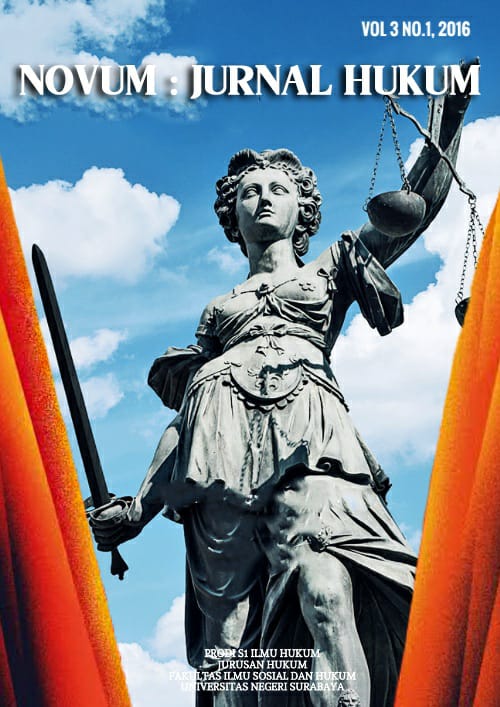Problematika Kewenangan Pemberian Izin Usaha Pertambangan Setelah Berlakunya Undang-Undang Nomor 23 Tahun 2014 Tentang Pemerintahan Daerah
DOI:
https://doi.org/10.2674/novum.v3i1.15460Abstract
Pasal 37 UU Nomor 4 Tahun 2009 Tentang Pertambangan Mineral dan Batubara (Selanjutnya disebut UU Minerba) menyebutkan bahwa Pemerintah Kabupaten/Kota memiliki kewenangan untuk menerbitkan Izin Usaha Pertambangan (Selanjutnya disingkat IUP). Hal tersebut senada dengan UU Pemerintahan Daerah Nomor 32 Tahun 2004 yang merupakan acuan UU Minerba dalam membagi kewenangan. Pada tahun 2014 UU Nomor 32 Tahun 2004 diubah menjadi UU Nomor 23 Tahun 2014 Tentang Pemerintahan Daerah (Selanjutnya disebut UU Pemda 2014), hal tersebut mengakibatkan terjadinya tumpang tindih kewenangan dalam pemberian Izin Usaha Pertambangan. Dalam UU Pemda 2014 Pemerintah Kabupaten/Kota tidak memiliki kewenangan menerbitkan IUP. Tujuan penelitian ini adalah mengetahui apakah Pemerintah Kabupaten/Kota masih berwenang menerbitkan IUP setelah berlakunya UU Pemda 2014 dan akibat hukum dari IUP yang dikeluarkan oleh Pemerintah Kabupaten/Kota. Metode penelitian ini adalah yuridis normatif. Adapun pendekatan yang digunakan adalah pendekatan perundang-undangan dan pendekatan konsep. Bahan hukum dalam penelitian ini menggunakan bahan hukum primer, bahan hukum sekunder dan bahan non hukum. Teknik pengumpulan data dikumpulkan dengan menggunakan teknik studi kepustakaan. Teknik analisis bahan hukum menggunakan teknik preskriptif. Berdasarkan hasil penelitian, ditinjau dari prinsip subsidaritas, prinsip pemerintahan pilihan dan asas preferensi, secara teoritis UU Minerba lah yang seharusnya diterapkan berkaitan dengan pihak yang berwenang mengeluarkan IUP. Akibat hukum dari tumpang tindih kewenangan terhadap IUP yang dikeluarkan sebelum UU Pemda 2014 adalah masih berlaku, sesuai dengan ketentuan pasal 402 UU Pemda 2014. Kata Kunci: Izin Usaha Pertambangan, Asas Preferensi, Akibat hukum Abstract Article 37, Law Number 9, year 2009, concerning Mineral and Coal Mining, states that Local Government has an authority to issue The Mining Business License, as referred from The Local Government Law Number 32, year 2004. However, in 2014, The Local Government Law Number 32, year 2004, was replaced by The Local Government Law Number 23, year 2014, which states that The Local Government does not have an authority to issue The Mining Business License. As a consequnce, there is an overlapping authority related to which side who has the right to issue The Mining Business License. The purposes of the research are, first, to find out whether The Local Government still has the right to issue The Mining Business License after the establishment of The Local Government Law Number 23. The second is, the legal consequences of The Mining Business License which is issued by The Local Government before the establishment of The Local Government Law Number 23. This research uses normative juridical method. While the approaches used are statute and conceptual approach. The legal materials used in the study are primary legal materials, secondary legal materials and non-legal materials. Next, this research uses literature review as the data collecting technique and prescriptive as the analysis techinque. Based on the result of the research, reviewed from the subsidarity principle, government preference principle, and preference principle; theoretically, the Law Number 9 should be used as the legal basis to determine who has the right to issue The Mining Business License. Then, the legal issue from this overlapping authority upon the Mining Business License is that the licenses which were published before the establishment of Number 23 is still valid according to the provision from article 402, Law Number 23, year 2014, concerning Local Government. Keywords : The Mining Business License, Preference Principle, Legal Issue
Downloads
 Abstract views: 123
,
Abstract views: 123
, PDF Downloads: 163
PDF Downloads: 163



